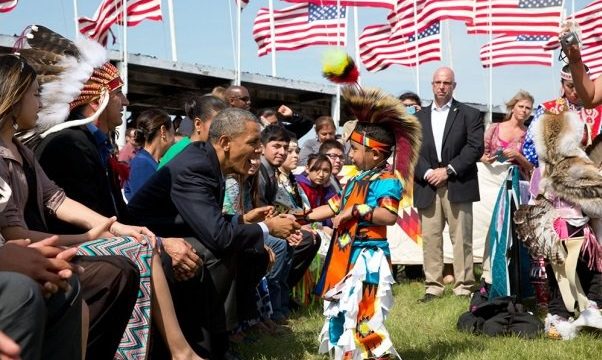Child Welfare Activists Say Obama's Visit To North Dakota Was "Totally A Photo Op"

During his (very brief) speech to the Native American community in Cannon Ball, North Dakota, last week President Barack Obama made it clear that he considers Native American children a priority.
“I understand that the Lakota word for ‘children’ — ‘wakanyeja’ — comes from the word ‘wakan’ — ‘sacred,’” President Obama told the attendees of a pow-wow event in Cannon Ball on Friday. “That’s what young people are — they’re sacred. They’re sacred to your families and they’re sacred to your tribe, and they’re sacred to this nation.”
But I spoke with two people who are very engaged on the issue of the welfare of Native American children, and they told me the President’s words ring hollow.
Betty Jo Krenz is a former employee of the Spirit Lake Sioux Tribe who will be testifying on Indian child welfare issues before Congress later this month at the invitation of Rep. Kevin Cramer. Elizabeth Morris is the chairwoman of the Christian Alliance for Indian Child Welfare. Audio of my interview with them on the Jay Thomas Show from Friday is above.
My article about their reflections on President Obama’s visit to North Dakota is up at Watchdog.org today:
…Betty Jo Krenz, a former employee of the Spirit Lake Tribe near Devils Lake in North Dakota, says the federal government is turning its back on Native American children.
“It’s a bad place,” Krenz says of the state’s reservations. “It’s a scary place to live. For some reason our government has chosen to overlook that.”
The Spirit Lake reservation has seen numerous reports of child abuse and deaths over the past two years, and many accuse the tribe and the federal government of failing to protect children there.
“The recurring deaths and child abuse cases on Spirit Lake are unacceptable,” North Dakota Congressman Kevin Cramer told the Jamestown Sun. “Clearly the current system is failing our children.”
Krenz was invited by Cramer, a Republican, to address a hearing of the House Natural Resources Subcommittee on Indian Affairs later this month. She says rather than bring Obama to North Dakota the federal government should have paid to bring Native American children to testify before Congress.
“(Sen.) Heidi Heitkamp wants to show Obama and Michelle this wonderful and beautiful show, and granted these pow-wows are wonderful, but it would have been a much better way to spend money to take a plane load of kids from around the country and let them go testify before this committee instead of just us and a few others,” she said.
Asked if she felt Obama’s visit would make a difference in protecting Native American children, Krenz said “absolutely not.”
“This is their way of saying, ‘Hey look at what we plan on doing for you guys.’ All they get are promises, and in the end the kids pay the price,” she said. “I get emails daily from people begging for help on the reservation, but what can I do?”
Elizabeth Morris, chairwoman of the Christian Alliance for Indian Child Welfare, says the federal government has been lax in protecting children in Native American communities.
“We can see it in the microcosm of Spirit Lake,” she said. “We can see the children abused. We can see the federal government turn its back on it.”
Of Obama’s visit to Standing Rock, Morris said it’s “totally a photo-op.”
“A photo-op for President Obama and Senator Heitkamp,” said Morris. “(Heitkamp’s) supposed bill to help tribal people and help tribal government is really just help for tribal government. It’s not help for tribal people.”
It’s often frustrating to me how little effort is put into correlating the promises politicians like Obama make about minority communities with the outcomes from the policies they put in place. Nowhere is the achievement gap between policy and outcome more palpable than Indian country, where access to universal health care and off-the-charts per-pupil education spending have done little to alter the social problems there.
The policies are failing, but the politicians just keep offering up more of the same.




